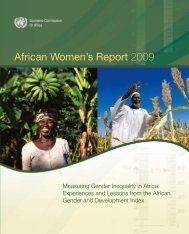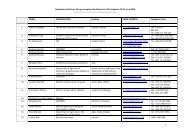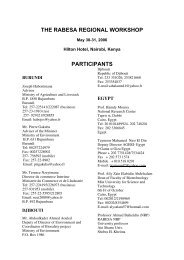Community-driven development decision tools for rural - IFAD
Community-driven development decision tools for rural - IFAD
Community-driven development decision tools for rural - IFAD
- No tags were found...
You also want an ePaper? Increase the reach of your titles
YUMPU automatically turns print PDFs into web optimized ePapers that Google loves.
political or project management interference, this type of exercise would have the advantages ofbeing low cost and replicable over time, which would allow <strong>for</strong> increasing the sample size andimproving the ability to make comparisons among projects and countries.Yardsticks to evaluate CDD project managementEven when the goal of developing sustainable CBOs and its related objectives are clearly specifiedduring project appraisal, progress towards that goal is not automatically ensured 44 ; it depends onmany factors that can affect project management. Some of these factors are external to the projectorganization while others can be identified in aspects of the project organization itself.Project coordinators face power influences at different levels which cause pressure to directproject resources to suit private interests that are not necessarily consistent with project objectives.The PCU must be protected against these interferences. Standard ways of exercising protectioninclude the donor’s approval of the AWP&B and items <strong>for</strong> expenditure over a certain amount andclearing loan withdrawal documents that support requests <strong>for</strong> replenishment of the SpecialAccount. However, these measures are more concerned with procedures <strong>for</strong> using funds than withsubstantive issues regarding the way projects are implemented. Visits by project supervisors, inparticular by country portfolio managers, can help address project implementation issues.Factors internal to the project organization include whether• the system of incentives <strong>for</strong> the project has been established;• the system of incentives is fully understood and agreed to by the key actors affected by it;• indicators to evaluate the per<strong>for</strong>mance of project managers are clearly included in theM&E system;• per<strong>for</strong>mance indicators <strong>for</strong> project managers are implemented from the beginning ofthe project.Simple yardsticks of project management per<strong>for</strong>mance can be used to help design the M&Esystem and to fill the gap between the beginning of a project and when the M&E system is fullyoperational. These are described in Box 41.Box 41Yardsticks to assess project staff’sper<strong>for</strong>mance in achieving CDD objectives• effectiveness in promoting theestablishment and sustainability of CBOs;• progress achieved in improving thecapabilities of the CBOs;• progress in establishing an enablingenvironment <strong>for</strong> the CBOs (i.e. worktowards improved institutions of thecentral and local government);• effectiveness in advocating the role of theCBOs in the local governance setting;• assessment of the quality of the CBOs(i.e. how their institutions work);• arrangements made to make serviceproviders accountable to the CBOs;• innovative procedures tested andintroduced to handle CBO microprojects;• measures taken to estimate the impact ofproject expenditures on the economy atthe community level, including mobilizingcommunity-level contractors andsuppliers and achieving effectivesustainability of CBO subprojects.44 There is a fair amount of evidence of this in <strong>IFAD</strong>. The limited sample of six CDD projects in Central and West Africa (Cape Verde,Ghana, Mali, Mauritania, Rwanda and Senegal) suggests that only the Cape Verde and Senegal projects were implementedreasonably in accordance with the policy agreed upon at design. In the other projects, important deviations from expectedper<strong>for</strong>mance were recorded, requiring significant interventions from <strong>IFAD</strong> headquarters.83
















